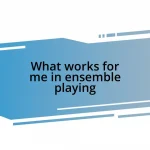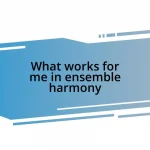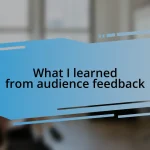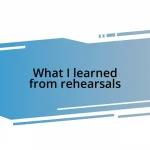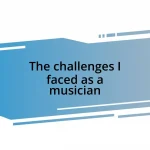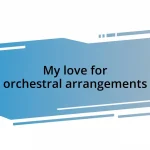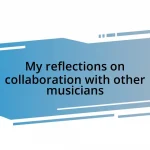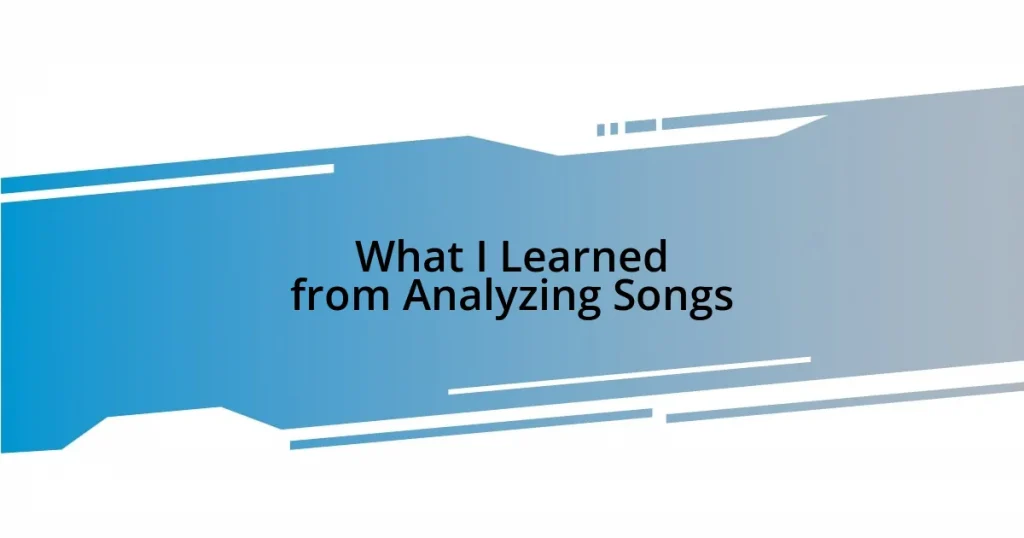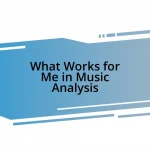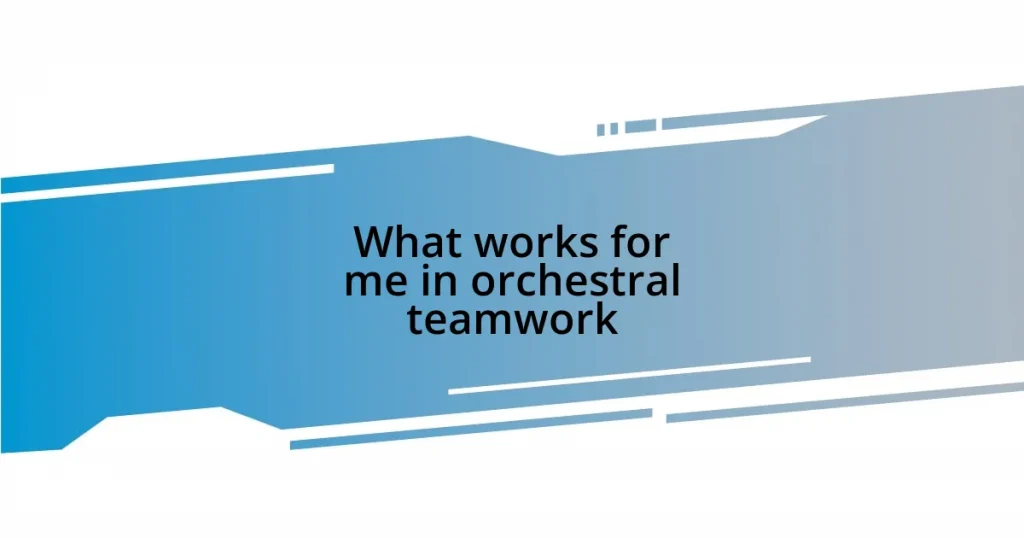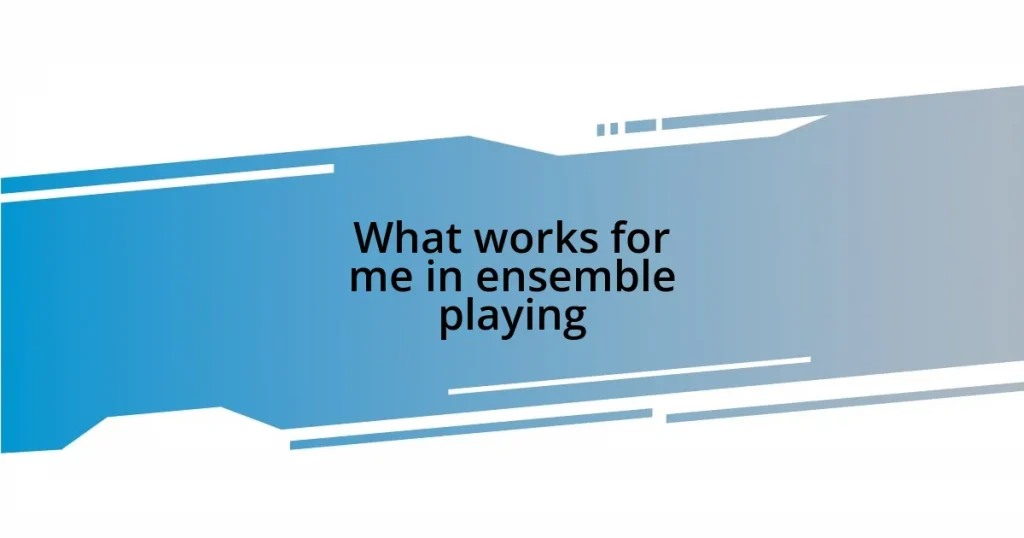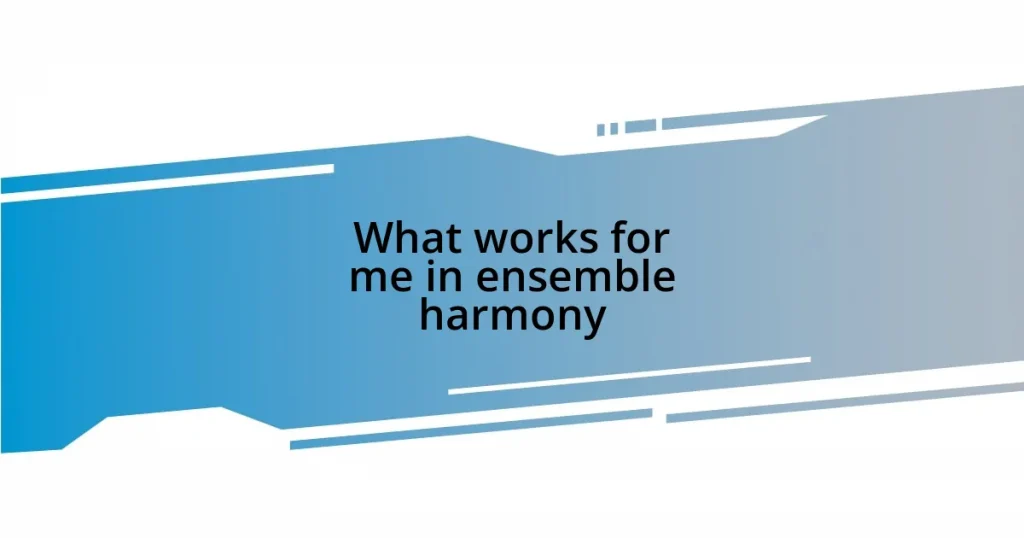Key takeaways:
- Dissecting lyrics, musical composition, and artist context enrich understanding and emotional connection to songs.
- Identifying song structure elements, such as verses and choruses, enhances appreciation for musical storytelling.
- Exploring lyrical themes reveals insights into personal and societal struggles, fostering a deeper bond with music.
- Analyzing songs can lead to personal growth, prompting reflections on resilience and self-acceptance through shared experiences.
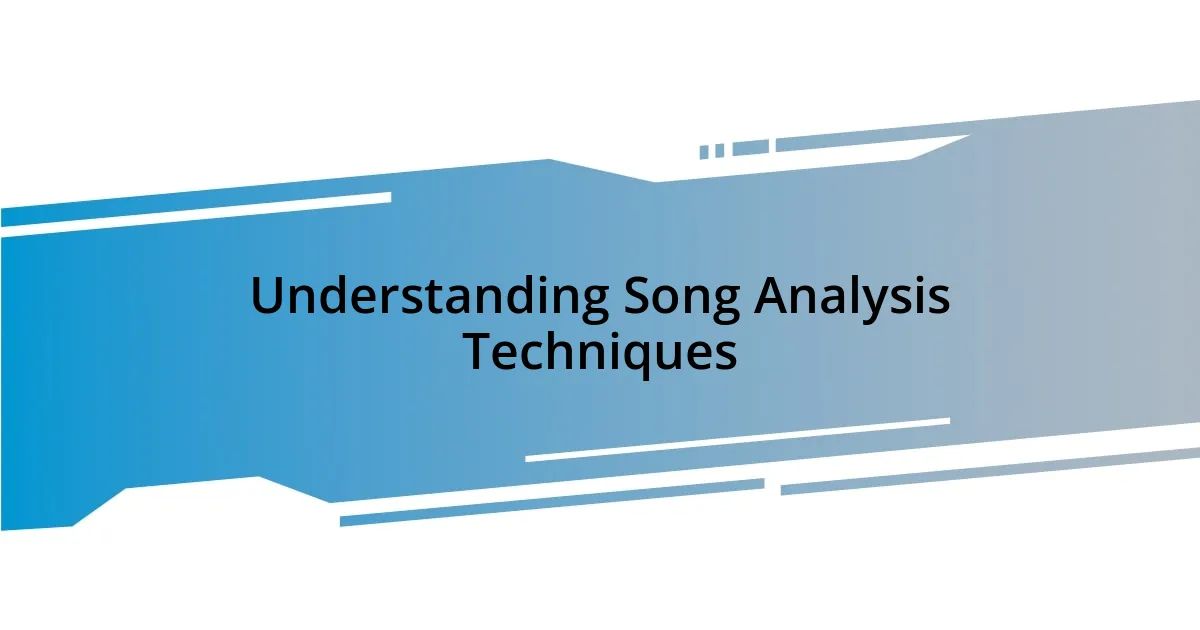
Understanding Song Analysis Techniques
One of the first techniques I often use is to dissect the lyrics. Analyzing every line helps uncover the underlying emotions and themes. For example, when I listened to a heartbreaking ballad, I found myself relating to the imagery of lost moments and nostalgia. Isn’t it fascinating how a few carefully chosen words can transport you to a different time and place?
I also focus on the musical composition—melody, harmony, and rhythm all play a crucial role in conveying feelings. I remember listening to an upbeat song after a tough day, feeling instantly uplifted by its tempo and beats. Have you ever noticed how the right chord progression can completely shift your mood? It’s like the music speaks directly to our heartstrings.
Finally, I consider the context in which the song was created. Understanding the artist’s background and the era can enrich the listening experience. When I learned about the struggles faced by a particular songwriter, it deepened my appreciation for their work. Don’t you think knowing the story behind the song adds a whole new layer to our connection with it?
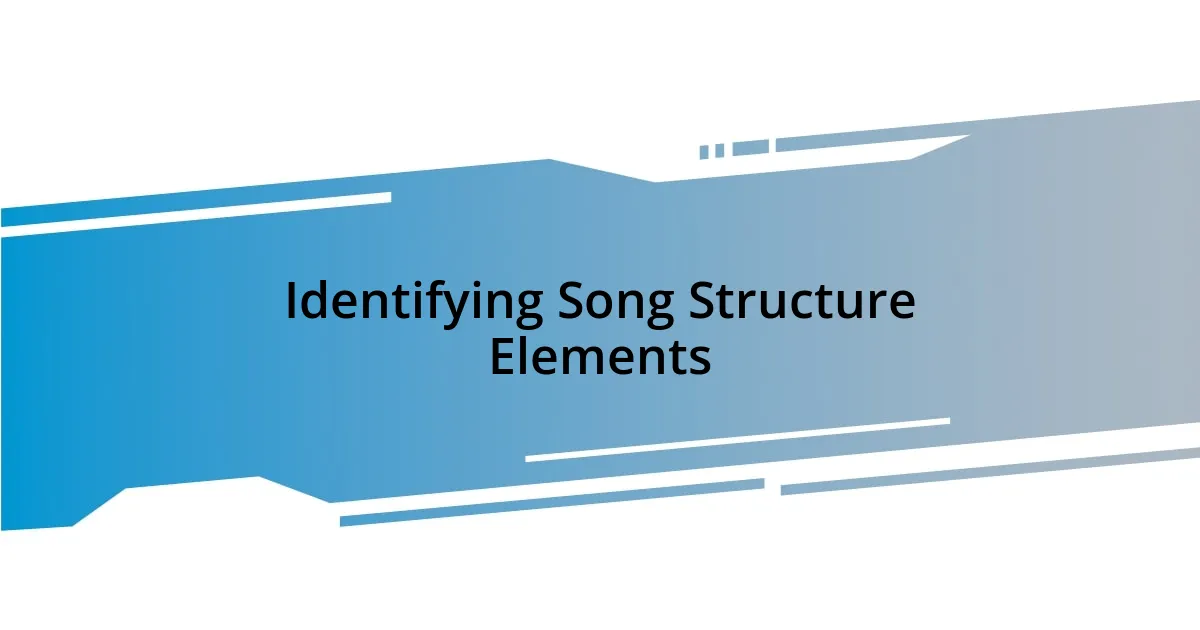
Identifying Song Structure Elements
Recognizing song structure elements is like deciphering a secret code that unlocks a deeper appreciation of the music. For instance, when I first noticed the repeating chorus, it reminded me of my own experiences with recurring themes in my life. Isn’t it amazing how certain phrases can resonate repeatedly, transforming a simple melody into an anthem of our own journeys?
The verse-chorus format is prevalent in many of my favorite tracks. I vividly remember the rush I felt hearing the transition from a somber verse to an explosive chorus. It was as if the song took a breath, preparing for that moment of release. This structure not only enhances emotional impact but also keeps listeners engaged. Have you felt that thrill when a song builds up to its high point, leaving you longing for more?
In analyzing various songs, I often compare the arrangements and how different sections relate to the whole piece. There’s something captivating about how a bridge can pivot a song’s direction, creating a memorable shift. From my experience, that unexpected twist often leads to a more profound emotional response. Have you ever listened closely and discovered that a minor change in structure can drastically shift your interpretation?
| Song Structure Element | Description |
|---|---|
| Verse | Develops the story or theme |
| Chorus | Repeated, catchy section that conveys main message |
| Bridge | Contrasting section that provides a musical and emotional shift |
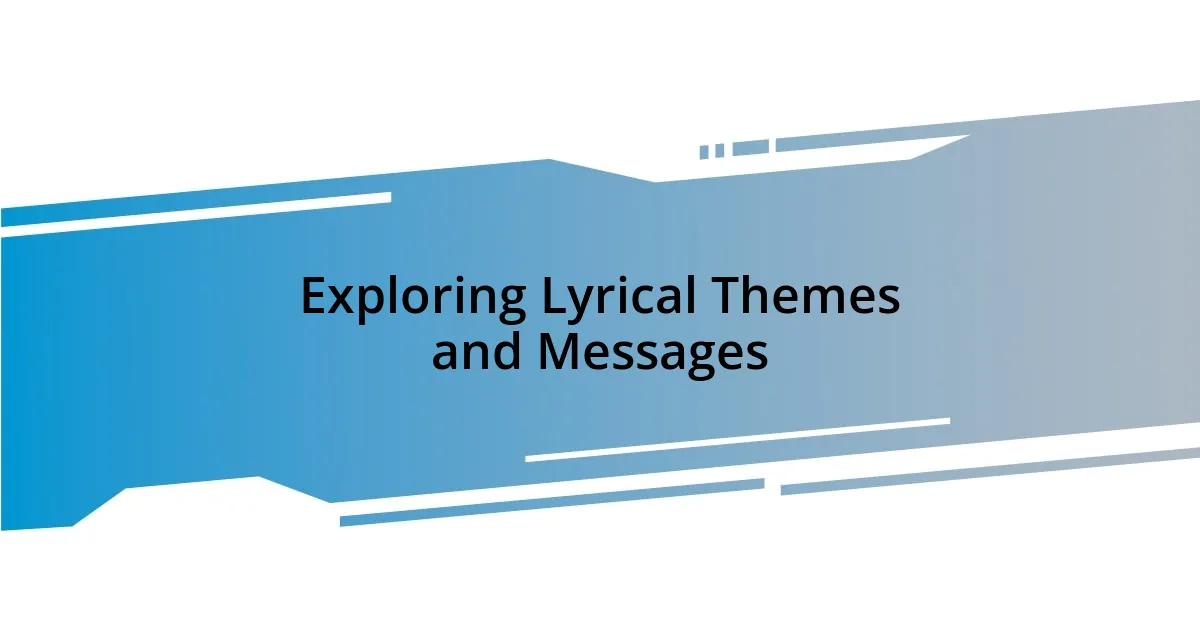
Exploring Lyrical Themes and Messages
Exploring the lyrical themes and messages in songs offers a treasure trove of insights. I often find myself reflecting on how lyrics can evoke strong emotions and tell powerful stories. Listening to a song about overcoming obstacles, I once felt a surge of motivation as the artist described their arduous journey. It’s remarkable how a few verses can encapsulate a life’s worth of experiences and struggles, resonating deeply within us.
When I dive into lyrical themes, I pay close attention to recurring motifs that might reflect broader societal issues or personal experiences. Here are some themes I frequently encounter:
- Love and Heartbreak: Songs often capture the complex emotions tied to relationships.
- Empowerment: Many lyrics inspire listeners to embrace their strength and authenticity.
- Nostalgia: Remembering simpler times, reflecting on past experiences, and evoking feelings of longing.
- Social Commentary: Critiquing societal norms or issues, providing a voice for the unheard.
- Identity Exploration: Lyrics that delve into individual struggles with self-identity and belonging.
Engaging with lyrics like this not only enhances my appreciation for the craft but also turns my listening experience into a personal journey of discovery. I love how these themes can invite listeners to reflect on their own lives, making music an intimate form of expression that connects us all.
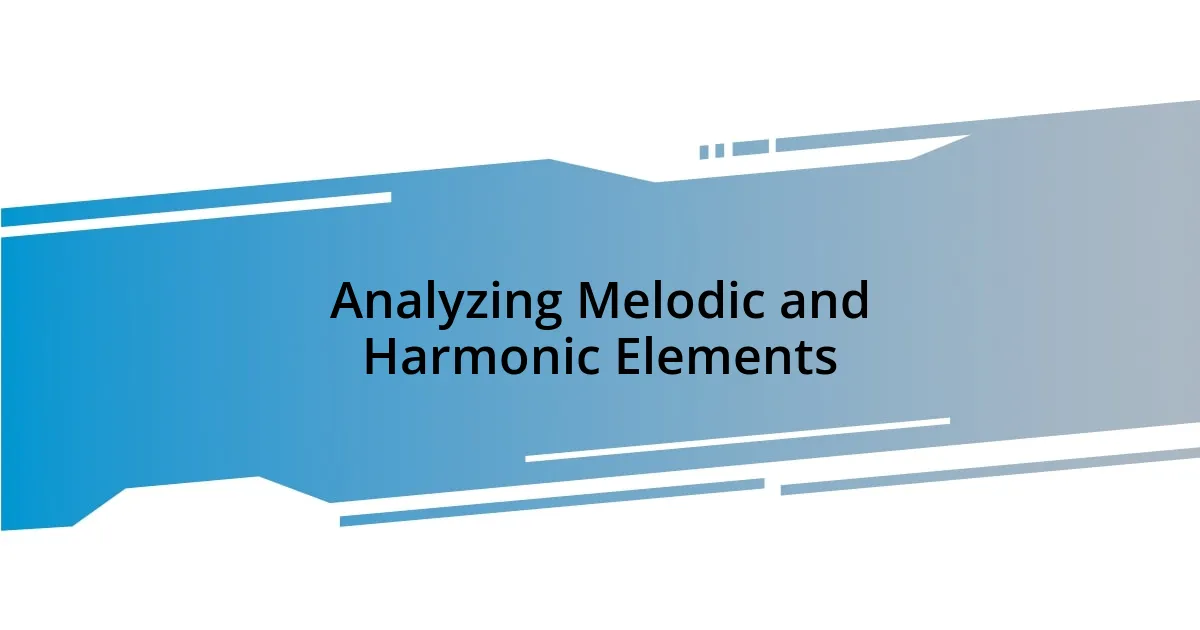
Analyzing Melodic and Harmonic Elements
When I delve into the melodic elements of a song, I pay attention to how a melody can evoke emotions just through its rise and fall. For example, there’s a particular track where the ascending notes create a feeling of hope and exhilaration, while descending phrases often evoke nostalgia and somber reflection. Have you ever noticed how a simple change in melody can transform your mood? It’s fascinating how composers use these techniques to tug at our heartstrings without a single word being spoken.
Harmonic elements add another layer of richness that I find captivating. Chords can create a certain tension or resolution, which, in turn, influences the emotional journey of a piece. I recall listening to a song that utilized unexpected chord changes, leaving me on the edge of my seat, wondering where it would go next. This interplay of harmony really offers listeners a sense of storytelling—each chord can change the narrative completely.
Ultimately, analyzing these melodic and harmonic layers enhances my understanding of the music I love. I find that the more I listen, the more I appreciate those nuances that make up the overall sound. Have you experienced that moment of clarity where you realize a song has so much more depth than you originally perceived? It’s like discovering hidden treasures each time you revisit a piece.
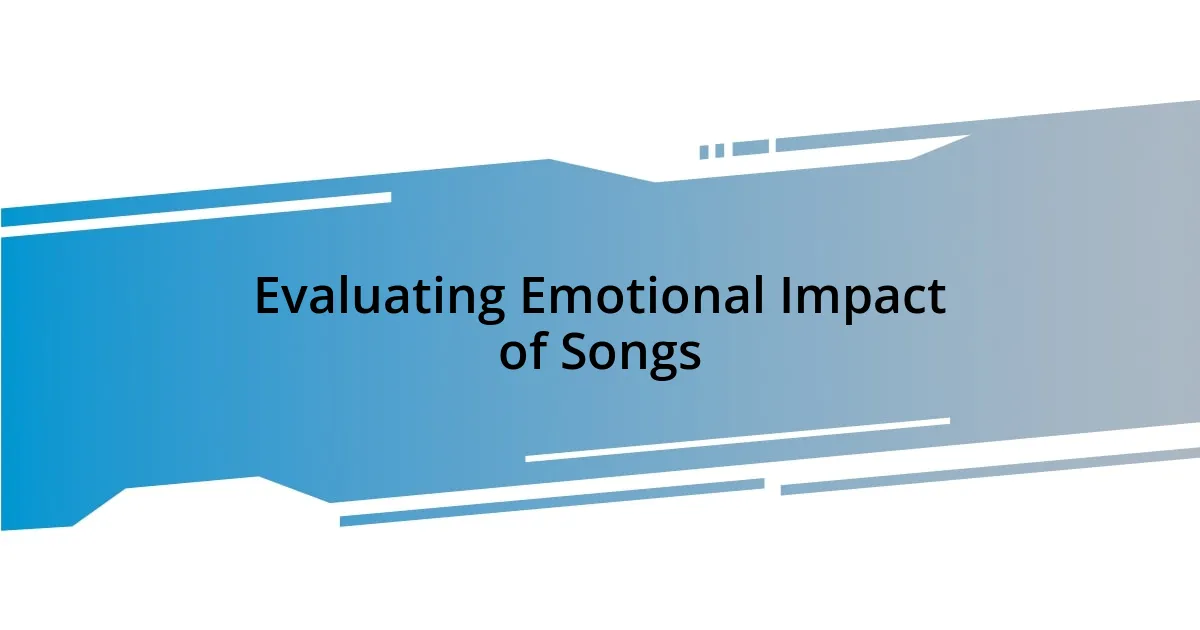
Evaluating Emotional Impact of Songs
I’ve often found myself moved by the emotional impact of a song, sometimes without fully understanding why. There was a time when I listened to a piece that just made me tear up; it was the way the artist’s voice cracked in a vulnerable moment that really hit home for me. Have you ever been in that space where a song just feels like it’s speaking directly to your heart? It’s moments like these that reveal the depth of music’s emotional resonance.
One thing I love to evaluate is the contrast between the lyrics and the music itself. For example, a seemingly upbeat song could have lyrics steeped in melancholy. When I first noticed this while listening to a popular hit, it struck me how the cheerful melody created an ironic backdrop to the heartbreaking story being told. This dual emotion created a compelling tension, similar to what we experience in real life—where joy and sorrow often coexist. Isn’t it intriguing how music can provide such a mirror to our own complex emotions?
Then, there’s the connection we all share with certain songs during pivotal life moments. I remember blasting a particular tune in my car during a tough breakup, and while the lyrics were raw and painful, they felt incredibly relatable and cathartic. That feeling of being understood, even if it’s through someone else’s experiences, creates a bond between the artist and the listener. Can you relate? There’s something profoundly healing in knowing you’re not alone in your heartache, all thanks to the power of music.
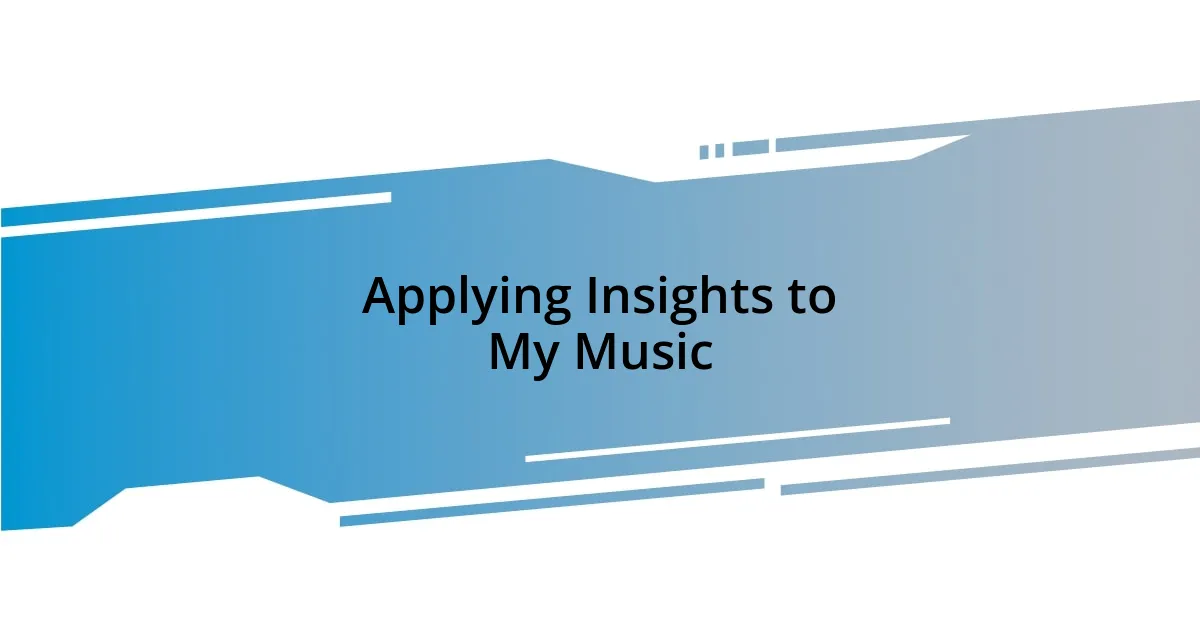
Applying Insights to My Music
When I started applying my insights from song analysis to my own music, I felt a newfound sense of purpose. I experimented with different melodic contours, aiming to mirror the emotional highs and lows I discovered in my analyses. One evening, while playing my guitar, I tried crafting a melody with an uplifting rise, only to have it reflect a recent struggle in my life. It became clear how powerful melody can be in conveying emotions.
Moreover, I began to consciously incorporate contrasting harmonies into my compositions. There was this moment when I combined a major chord with a haunting minor transition, and it took the whole piece to a different emotional plane. It was as if I was inviting the listener to experience the intricate dance of hope and despair. Have you ever felt the thrill of creating something that resonates with your own experiences? For me, it was a profound moment of realization—the music wasn’t just for others, it was an extension of me.
As I refined my lyrical themes, I channeled my personal experiences, giving voice to my inner thoughts and struggles. I remember writing a song inspired by a friend’s battle with anxiety; it was deeply cathartic to express feelings I had often held in. I found that weaving real stories into my music not only deepened my connection with listeners but also provided a sense of community. Isn’t it incredible how sharing our vulnerabilities through music can foster connections we might not experience otherwise?
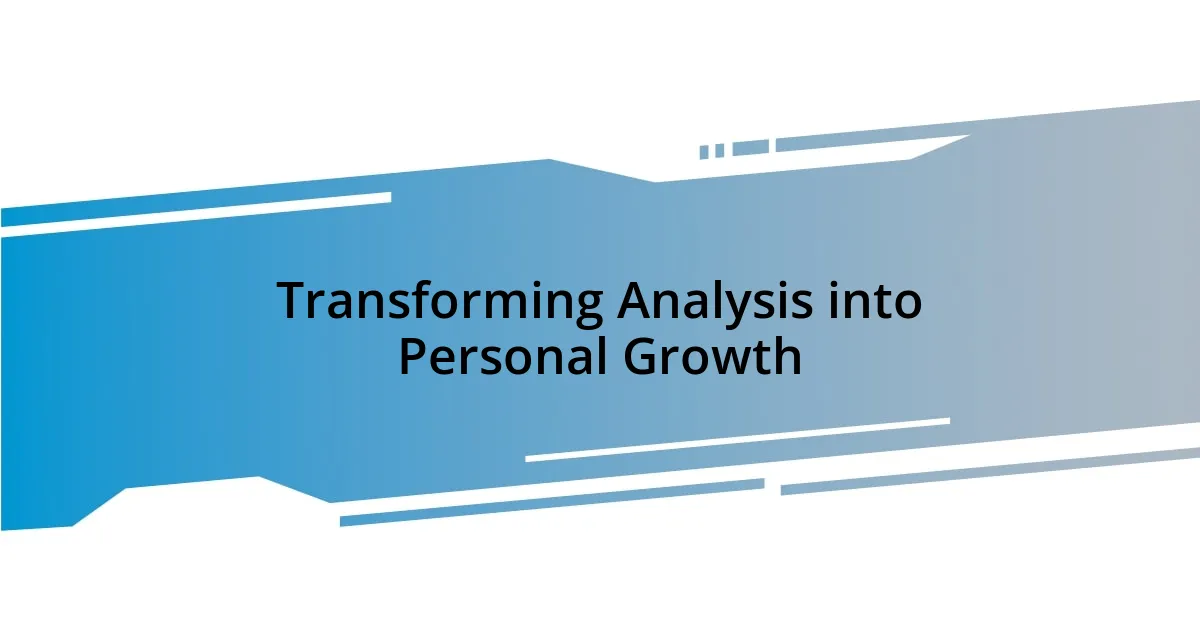
Transforming Analysis into Personal Growth
Reflecting on the themes unearthed through song analysis, I’ve realized how they can actively shape my personal growth. For instance, I once dissected a song that talked about resilience, and each replay revealed new layers of meaning. It made me question my own approach to challenges. How often do we let setbacks define us? Instead, I started embracing obstacles as opportunities for growth, shifting my mindset significantly.
One day, while listening to a poignant ballad about loss, I had a breakthrough moment. The artist spoke about moving on, and it struck me deeply. I had been grappling with an old friendship that wasn’t serving me anymore. That song prompted me to confront my feelings, ultimately guiding me to make necessary changes in my life. Have you ever experienced this? Transformative moments like these often lie within lyrics we connect with, allowing us to navigate our own journeys more effectively.
Moreover, I began to notice how certain songs provided clarity during confusing times. Listening to a powerful anthem about self-acceptance, I felt an urge to write down all the qualities I admired in myself. It was like the music illuminated parts of me I’d overlooked. Does music have a way of revealing your true self? For me, it became a tool for self-discovery. Each melody not only resonated emotionally but also fostered a deeper understanding of who I was and who I wanted to become.


